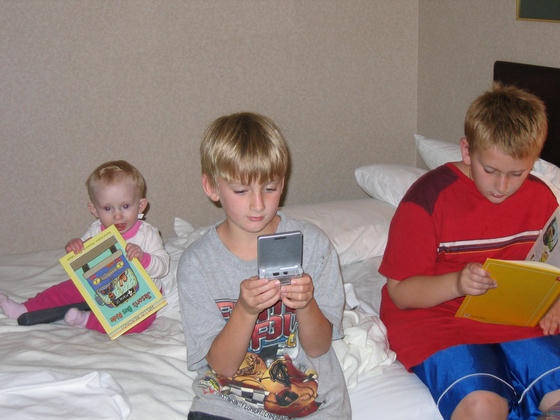Are books (especially bound books) and reading still relevant tools for learning?
Today’s kids are doing their homework online, no longer need to borrow library materials to research a project, and use YouTube as their go-to source to learn about their world. But let’s not count out books as a powerful tool for mastering academics and for learning social emotional and life skills. As a clinical child psychologist who is also an avid reader, I strongly encourage kids to read on a regular basis. Kids who visit me in my office are given free books and comics–as long as they promise to go home and read.
In our work at LW4K we actively explore how to use video games, apps, and other technologies to promote the development of executive functions and have begun to explore how other activities–reading, playing board games, sports, and artistic pursuits–can be used to improve executive functions and social emotional learning skills. One of the best sources for learning about real world executive functioning and social emotional learning skills can be found in children’s books. Getting reluctant readers to open and enjoy a book is tricky but worthwhile.
There are many books for kids and teens that are written to directly teach executive functions and social emotional learning skills, such as my book, Train Your Brain for Success: A Teenager’s Guide to Executive Functions. Unfortunately my book and other non-fiction guides to improve these skills are not destined to become bestsellers. However, there are many popular books that kids are already reading in which characters display these skills.
Teachers and parents can use many of these best sellers as a tool to promote these life skills. Many plot lines and character developments in popular books such as the Harry Potter or Percy Jackson series can be used as opportunities to teach skills such as planning, persistence, flexibility, sustained attention, perspective taking, self control, decision-making, and collaboration.
Here are some suggestions about how parents, teachers, tutors, and clinicians can use popular books to improve executive functions and social emotional learning skills.
- Read the books along with your child/student so that you can discuss how these skills were crucial to the characters decision-making and success.
- Combine the book with the movie version (many of the most popular books have movies) to encourage more engaged discussion. Occasionally pausing the movie to talk (as long as you don’t overdo it) can improve insight into the importance of the executive and social emotional learning skills.
- If you don’t have time to read the entire book with your child/student, look for a graphic novel version or read a few reviews and summaries on Amazon or Goodreads. It’s important for you to have some talking points.
- Use the book as an opportunity to take other’s perspectives. Help the child to view the storyline from a secondary character’s perspective or even from the “bad guys” or antagonists viewpoint.
This is the first of a series on books selected to help children improve executive functions and social emotional learning skills. The steps outlined in the current article can be applied across the many different books that will be recommended. In addition, articles in the series will discuss strategies such as using audio books, graphic novels, ebooks, Amazon Whispersync, comics, and other audio visual tools that support the use of books to improve executive functions and social emotional learning skills.
We would love to get comments and additions from parents, teachers, tutors, and clinicians for your favorite children’s books to add to the series and encourage you to read each post and provide us with additional information that will benefit children.
See also:
Book Recommendations for Kids with ADHD and Executive Functioning Issues
Summer is Not for Vacation, It’s for Reading, Exploring, and Expanding
84 Video Games That Encourage Reading
Featured image: Flickr user Elizabeth




